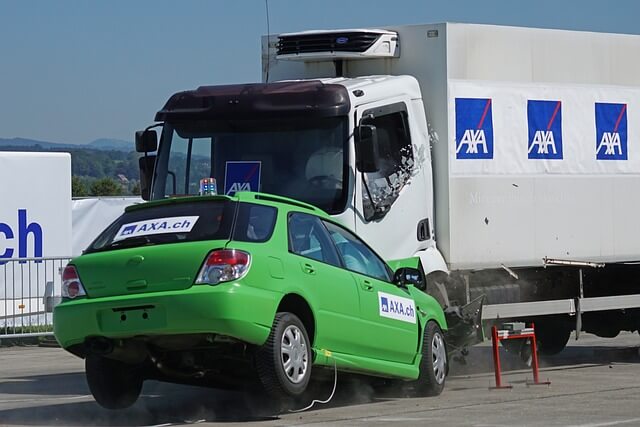Commercial trucks and semi-trailers must maintain exceptional maintenance standards to improve their safety on the road. The operators of these trucks must also have a certain amount of sleep and take adequate rest breaks at specific intervals to prevent drowsiness behind the wheel. However, despite such preventive measures, many fatal accidents across Georgia still involve commercial trucks.
According to the Georgia Governor’s Office of Highway Safety records, there were 10,473 crashes involving large trucks in Georgia in 2020. These crashes resulted in 3,244 injuries and 182 fatalities. Semi-truck accidents are four times more likely to result in fatalities than accidents involving smaller vehicles. If you happen to live in Roswell, GA, for instance, and in the unfortunate incident that a semi-truck hits your car, you will need the help of a trusted Roswell truck accident lawyer to protect your rights and help you get the just compensation you deserve.
Common Legal Terms You Should Be Aware Of
Whenever you’re involved in an accident with a truck, you may need to understand the legal terms you might have to deal with. The most common ones include:
1. Damages
If someone is hurt in a car wreck or any other personal injury accident, they can suffer losses. For example, they have to pay for medical treatment or lose money due to missed work because of the injury. These losses are referred to as “damages.” In addition to lost wages and medical bills, damages may include the cost of repairing your car. You may also suffer emotional damages due to a great deal of pain and suffering associated with the injuries incurred.
2. Liability
Liability refers to a fault. If the truck driver is to blame for your accident, they are liable for your damages. But since some insurance company adjusters may shift liability to you, you should work with a skilled attorney to defend you against any tricky tactics an insurance company may try to deny you the fair compensation you deserve.
3. Made Whole
This legal principle simply states that the plaintiff’s insurer should not receive any funds from a settlement with the defendant’s insurance provider until all of the plaintiff’s needs are fully covered. The plaintiff should be “made whole” at the end of the settlement.
4. Negligence
If a truck driver caused your accident by abruptly coming to your lane or failing to indicate when changing lanes, they have committed negligence. It is considered negligence if they fail to meet the duty of care owed to all vehicle operators.
5. Demand Letter
Your lawyer writes a demand letter to request the recipient to take or cease a specific course of action. It’s what starts the negotiation process between the plaintiff and the defendant. A demand letter must convey essential information, including how much harm the victim has suffered and the relief they seek. It may also state the possibility of a lawsuit if the demands aren’t met.
6. Letter of Protection
A letter of protection (LOP) is a letter your lawyer sends to a doctor or healthcare provider to guarantee payment for all medical treatments given to the plaintiff after they receive fair compensation. It’s a promise that the physician will be paid and that medical treatment should continue.
7. Defendant and Plaintiff
In a truck accident case, the defendant here is the party from whom you are trying to recover damages. This could be the negligent driver or the trucking company. The plaintiff, on the other hand, is the person who brings a legal action, such as a lawsuit.
8. Personal Injury Protection (PIP)
PIP or “no-fault” insurance helps to cover expenses resulting from a truck accident – regardless of who was at fault. If you’re involved in a truck accident, your PIP insurance will cover your medical expenses plus those of any passengers who were in the vehicle at that time.
9. Policy Limits
Car insurance policies have a limit on the maximum amount they will pay in case of an accident. For example, if the defendant’s insurance policy has a bodily injury limit of $40,000, that’s the maximum amount of money you will be paid in case of an accident.
So, if your expenses are more than that amount specified, your lawyer may need to look for other liable parties, such as the trucking company.
10. Pre-Existing Condition
Some insurers will try to prove that the injuries you claim were not due to the accident itself but due to other issues before the wreck occurred. In such a case, the victim is considered to have had a pre-existing condition. Assuming you had a pre-existing condition, your lawyer can still argue that the accident worsened your condition.
11. Settlement
A settlement is reached when the plaintiff and the defendant come to a legal agreement that resolves the dispute. It means agreeing to a specified amount of money for your damages. However, some insurance companies will offer low-ball settlements that won’t cover all your damages. A skilled personal injury lawyer can produce solid evidence to convince the insurer to offer equitable compensation.
12. Uninsured/Underinsured Motorist Coverage
You’ll be surprised to find that some motorists drive without insurance. And if they have coverage, paying for all your damages may not be sufficient. Fortunately, your insurance policy may include uninsured/underinsured motorist coverage. This ensures you’ll still be covered even if the defendant doesn’t have insurance.
Contact an Experienced Attorney to Answer Your Questions
Understanding these legal terms can be confusing, especially if you haven’t dealt with a personal injury claim. Working with an experienced personal injury lawyer can help you navigate the complexity of the litigation process. They’ll explain everything in simple English and explain how they plan to help you obtain fair compensation. If you or your loved one has been injured in a commercial vehicle or truck collision, contact a skilled truck accident lawyer as soon as possible.
















